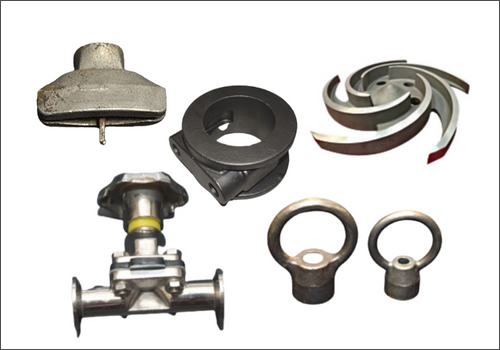Ferrous alloys are iron based alloys that has extensive use in wide range of industries because of its flexibility to meet strength, toughness, and impact of diverse industrial Ferrous applications
Metals like carbon steels, alloy steels, stainless steels, tool steels, cast iron, cast steel, manganese steel, and specialty or proprietary iron-based alloys.

We use following material for Ferrous Casting
Indo German Shell Cast has emerged as a market leader in producing Ferrous and Non-Ferrous Alloy Casting,Investment Casting, Pharmaceutical Valves and Accessories, Forging Parts and other related products.To meet the growing demand for heavier castings and fully machined components, we serve as a one stop solution and cater to diverse customer requirements with precision and efficiency. Our company stands out due to its exceptional performance, teamwork, stringent quality control, advanced production capacity and on-time delivery.
Ferrous casting is a manufacturing process that shapes molten ferrous metals into precise forms using molds, making it a preferred method for producing strong components. Since ferrous metals contain iron, they are widely used across industries due to their adaptability. The process begins with selecting an appropriate ferrous alloy based on the required properties. Common materials for ferrous casting include Stainless Steel (SS), Investment Grade SS-304, SS316, SS410, Spheroidal Graphite Iron (SG Iron) (EN Grades), Wrought Carbon (WCB), Mild Steel (MS) and all grades of Cast Iron. Cast iron, with its high carbon content, offers exceptional durability, whereas steel, with lower carbon levels, is preferred for its strength. Die casting is frequently employed for ferrous metals when high precision and mass production are essential, while the casting method itself depends on factors like size and complexity. Controlling mold temperature is crucial, especially for ferrous metals, to prevent cooling defects and ensure a smooth surface finish. The thermal conductivity of the mold material directly influences heat transfer, affecting solidification and the final casting structure.
Additionally, cores and chaplets are often used to create and stabilize hollow sections under the pressure of molten metal. To further enhance properties such as strength, ductility and oxidation, ferrous alloys undergo heat treatment processes. Stainless steel, for example, is widely used in harsh environments due to its excellent resistance to wear and corrosion. The adaptability of ferrous metals allows alloying with other elements, making them ideal for diverse applications, from structural components to automotive parts like engines and braking systems. This combination of precision,durability and flexibility makes ferrous casting a cornerstone in modern manufacturing.